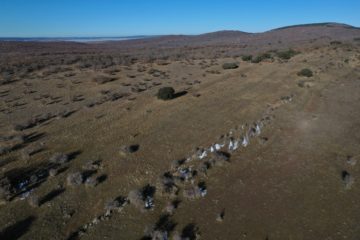Rewilding Europe has been awarded an $80,000 grant by the Endangered Landscapes Programme to explore rewilding potential in central eastern Spain. High levels of land abandonment and rich biodiversity give this area huge scope for landscape-scale rewilding.

Iberian Chain
The focus area of the funded project is located at the southern end of the Iberian Chain (Sistema Ibérico). The Iberian Chain is one of the major Spanish mountain ranges. A vast, complex area of mostly high and rugged mountains, it stretches from the centre of the Iberian Peninsula to the periphery of eastern Spain’s Mediterranean coast.
A recent history of land abandonment, which characterises many of Rewilding Europe’s operational areas, has seen thousands of inhabitants of mountainous areas migrate to cities. As a result, the project area has one of the lowest population densities in Europe.
Transformative potential

Land abandonment has had both positive and negative consequences for the Iberian Chain. Many wildlife species have made a gradual comeback, with populations of ungulates such as deer, ibex and wild boar increasing in the project area (although they are still below natural levels). No large carnivores, like the Iberian wolf, are present in the area at this moment.
The decrease and disappearance of domesticated herbivores means open areas are shrinking, with a commensurate increase in the risk of wildfire. Without an alternative pathway for development, economic stagnation could led to unsustainable and destructive activities, such as the logging of old-growth forests, wind farms, excessive hunting, fracking and mining.
Across the Southern Iberian Chain, rewilding has the potential to transform current challenges posed by land abandonment and unsustainable resource use into opportunities for the restoration of natural grazing and trophic cascades, dam removal and old-growth forest protection.
As one of the most extensive natural and inhabited areas of Spain, the project area could become one of Europe’s most spectacular connected natural landscapes. Burgeoning wildlife comeback and a rise in nature-based tourism would help to revitalise local economies and sustain increasing numbers of local livelihoods.
First step
Funded by the Endangered Landscapes Programme grant and led by Rewilding Europe, the Southern Iberian Chain Project will start in September and end in the summer of 2020, with partners including the University of Alcalá and Spanish NGOs Terra Naturalis and Asociacion Micorriza. As a preparatory project, it will result in a fully developed strategy for rewilding the area, as well as a network of partnerships with local stakeholders.
“We are delighted and deeply grateful to have received this grant, which continues Endangered Landscapes Programme’s highly valued support for Rewilding Europe,” says Deli Saavedra, Rewilding Europe’s Rewilding Area Coordinator. “The new funding is hopefully the first step towards the eventual rewilding of the area, which could bring wide-ranging and much-needed benefits to both wild nature and local communities.”
Collaborating for the future
One of the project activities will be to identify early adopters for a landscape-scale restoration initiative, and to develop a network of partnerships with key stakeholders such as regional governments, mayors, hunting associations, local associations and entrepreneurs.
Efforts on the ground will result in the development of a comprehensive strategy for rewilding the area (including vision, overall aim, objectives and results). The project area has been nominated as a rewilding area for inclusion in the Rewilding Europe portfolio – this nomination would be developed into a full proposal and to be submitted to potential donors. A landscape business plan would also be drawn up to demonstrate how rewilding could help to develop different sectors of the local economy.
“As Rewilding Europe’s efforts have demonstrated in other areas of Europe, rewilding can improve the ecological condition of the Southern Iberian Chain, ensuring it serves multiple functions for people and wild nature,” says Professor José María Rey Benayas of the University of Alcalá’s Department of Life Sciences. “With their low population densities, rural areas such as these are some of the best places for the reintroduction of wild herbivores.”
Progressive programme
This new grant is the third awarded to Rewilding Europe by the Endangered Landscapes Programme, following grants in 2018 for implementing large-scale rewilding projects in the Danube Delta and the Greater Côa Valley of northern Portugal. This newly-awarded grant is one of ten Project Planning Grants recently announced by the programme, intended to fund preparatory work for the development of exciting, innovative European landscape restoration projects.
The Endangered Landscapes Programme was recently established thanks to a $30 million investment from Arcadia, the UK-based charitable fund of philanthropists Lisbet Rausing and Peter Baldwin. Supporting charities and scholarly institutions that preserve cultural heritage and the environment, it has awarded more than $500 million to projects around the world since 2002. The Project Planning Grants have also received additional generous support from Fondation Segré.
The programme is managed in partnership with Arcadia by the Cambridge Conservation Initiative, a unique collaboration between the University of Cambridge and nine leading internationally-focused biodiversity conservation organisations clustered in and around the city of Cambridge. In line with Rewilding Europe’s own objectives, the Endangered Landscapes Programme envisions a future in which Europe’s landscapes are enriched with biodiversity, establishing resilient, more self-sustaining ecosystems that benefit both nature and people.
Want to know more?
- Visit the Endangered Landscapes Programme website
- Read more about rewilding and land abandonment
